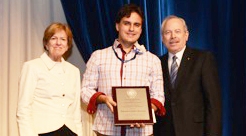Advancing Society with Science
Submitted by Mónica Ivelisse Feliú-Mójer on
The answer to many of the environmental, health, social and economic challenges faced by modern society lay in the advancement of science, engineering and innovation. Thus, scientists and engineers must play a role in making science accessible to the public they aim to help with their discoveries.
Organizations such as the American Association for the Advancement of Science (AAAS) aim to increase communication between the scientists and the public to "advance science and serve society."
Recently, three Puerto Rican scientists received high honors from AAAS, during the society's annual meeting, held February 16-20 in Vancouver, Canada. Dr. Mariano García-Blanco, from Duke University, and Dr. Gregory Quirk from the University of Puerto Rico Medical Sciences Campus, were inducted as Fellows of AAAS. Meanwhile, Dr. Daniel Colón-Ramos received the AAAS Early Career Award for Public Engagement with Science.
Unraveling the Secrets of RNA
For the last two decades, Dr. Mariano García-Blanco has been studying the biology of RNA, an essential molecule for life. About six years ago, Mariano began a "scientific adventure" and rekindled his interest in flaviviruses—which he studied during his M.D., Ph.D. at Yale University—this time the one that causes dengue fever. "The dengue virus is an RNA virus, so we had the tools to study it," says Mariano.
Dengue fever affects hundreds of millions of people and leads to tens of thousands of annual deaths. The disease is endemic in Mariano's native Puerto Rico, so it was no stranger to him. However, it was not until Dr. García-Blanco traveled to Asia that he fully appreciated the economic and social consequences of dengue fever. "At first I wanted to understand dengue, but now curing it has become a mission," he says with great conviction, "to help millions of people."
Also, Mariano firmly believes in the social and economic prowess of science. Since 2005, Mariano has been a Trustee for the Puerto Rico Science, Technology and Research Trust, working to build a sustainable knowledge-based economy in the archipelago. He also maintains "an intellectual exchange with the University of Puerto Rico. I teach there and bring students and scientists to train in my lab. It's important for me to have that connection."
Mariano was inducted as a Fellow of AAAS in recognition for his contributions to our understanding of RNA biology, as well as his commitment to make social contributions through his science.
Science with Purpose
After obtaining his Ph.D. from the State University of New York (SUNY), Dr. Gregory Quirk found himself questioning the point of science. His scientific 'soul searching' led him to Honduras, where he combined science and human rights, studying stress disorders in the families of the disappeared in this Latin American country. While still in Honduras, Gregory was awarded a prestigious Fulbright grant to set up the first neuroscience laboratory in the country, where he established a malnutrition model to study how malnourishment affects the brain. "These experiences helped me realize that if science is done in the right context, embraced in the right place, it can really benefit society," he says.
For 15 years, Gregory and his group (first at the Ponce School of Medicine and currently at the Medical Sciences Campus of the University of Puerto Rico) have studied the mechanisms of how the brain overcomes fear, hoping to better comprehend anxiety disorders (such as phobias) and help define possible treatments.
Like Mariano, Gregory was just inducted as a Fellow of AAAS, for his contributions to understanding the mechanisms of fear conditioning in the brain and his efforts to enhance ethnic diversity in neuroscience. "Science must engage more of the world countries and cultures, if we are going to solve the big mysteries of the brain," says this adopted Puerto Rican, originally from Connecticut. "I made my career here (in Puerto Rico), from scratch. My laboratory is like a family. I would not trade doing science here for anything in the world."
The New Generation
Dr. Daniel Colón-Ramos, assistant professor at Yale University and director and co-founder of Ciencia Puerto Rico, completes the trio of Puerto Ricans making waves at AAAS. His work with Ciencia Puerto Rico—promoting science, research and scientific education in Puerto Rico— together with his contributions and success as a young researcher in neuroscience, earned Daniel the 2011 AAAS Early Career Award for Public Engagement with Science.
Daniel "is an exceptional model for the new generation of scientists and engineers," said Alan I. Leshner, Chief Executive Officer of AAAS and Executive Publisher of the prestigious journal, Science.
"I am very honored by this award. However, this is truly a recognition of Ciencia Puerto Rico and the dedicated team of volunteers and collaborators that make the organization's work happen," says Daniel. Six years ago, Daniel created Ciencia Puerto Rico, longing to stay connected with Puerto Rico and its scientific community in a way that provided meaningful social impact. "Ciencia Puerto Rico helps bridge the gap. It allows scientists like Mariano and Gregory to communicate with the public that will benefit from their research," he said.
Despite their different backgrounds and research interests, Mariano, Gregory and Daniel are a great example of the impact that scientists can have and should on their communities. Through their work and commitment this trio not only promote help advance our society through their science, but they also demonstrate that there are no limits to Puerto Rican science.








